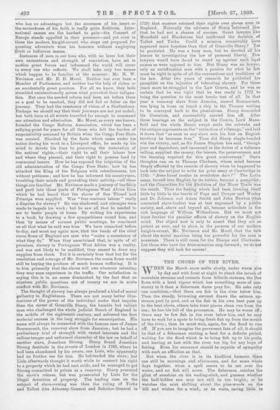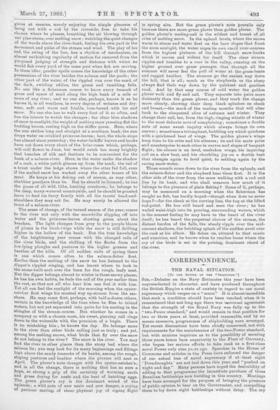THE CHORD OF THE RIVER.
WHEN the March snow melts ,slowly, under warm airs . by day and with frost at night to ,obeck the inrush of mountain streams and runnels from hillside streams, the Dee flows with a level vigour which has something more of con- stancy in it than a fisherman dares pray for. He asks only one condition,—that there are fish in the river below him. Then the steady, brimming current draws the salmon. Up- stream pool by pool, and as the fish in his own beat pass up to the beat above, others take their places clean run from the sea; he has his toll of the procession. He may be worse off ; these may be few fish in the river below him, and he may have to wait for a spate to bring fresh fish up from the mouth of the river ; then he must wait, again, for the flood to run off. If you are to,imagine the perversest fate of all, it should be that of a fisherman renting a beat for a definite period, waiting for the flood which is to bring fish up to his pools, and leaving at last with the river too big for any hope, of fishing. Even his successor ehould be capable of sympathy with such an affliction as that.
But when the river is in its kindliest humour, there can .still be mornings and afternoons, and for some whole days together, when a spell seems to be set over the water, and no fish will move, The fisherman , catches the glint of sunshine on his wading-stick, and guesses whether the half-hidden sun may not still be too bright; or he watches the mist shifting about the pine-woods on the hill and wishes for a wind; or he waits, caring little to
guess at reasons, merely enjoying the simple pleasure of being out with a rod by the riverside, free to take his chance where he pleases, breathing the air blowing through Wet pine-stems, over melting snow ; watching the quiet changes of the woods above the river-bank, feeling his own part in the movement and pulse of the stream and wind. The play of his rod, the swing of the line, has a rhythm of mechanism, an almost unthinking regularity of motion far removed from the purposed judging of strength and distance with which he would fish every yard of the same pool when fish are moving. In these idler, gentler spells comes the knowledge of the other possessions of the river besides the salmon and the pools; the other part of the water, of the rippled run over the sand, of the dark, swirling eddies, the green and tumbling falls. No one like a fisherman comes to know every tussock of grass and space of sand along the high bank of a mile or more of any river ; and no one else, perhaps, knows. it as he knows it, in all weathers, in every degree of wetness and dry- ness, soft and warm and friable, iron-bound with ice and snow. No one else has to walk every foot of it so often, and has the leisure to watch the changes ; the clear blue shadows of snow in sunlight, the weight of melting snow pressing fiat the budding broom, resting high on the stiffer gorse. Here, where the sun strikes long and straight at a southern bank, the fain drops water on crinkled primrose-leaves ; here, the whole slope has altered since yesterday ; the water-bailiffs' knives and hooks have cut down every shoot of the briar-roses which, perhaps, will still flower in June, but would catch too many brightly tied bunches of silk and feathers to be convenient for the bank of a salmon-river. Here, in the water under the shadow of a rock, a white patch gleams up from the sand; the tail of a trout under the ledge shows where the otter fed full, even if the melted snow has washed away the other traces of his meal. He keeps at his fishing out of season, as may other, shabbier poachers than he. But he should be licensed; he has the grace of all wild, lithe, hunting creatures ; he belongs to the deep, many.watered countryside, and he should be granted leave to feed his furry family with all the trouts' bead-and- shoulders they may ask for. He may surely be allowed the trout of a salmon-river.
The sense of change, of the turned season of the year, comes to the river not only with the snowdrifts slipping off into water and the primrose-leaves showing green about the bracken. The light changes from grey to the purple bloom of plums in the birch-twigs while the snow is still drifting higher in the hollow of the bank. But the true knowledge of the heightening year comes with the changed calls of the river birds, and the shifting of the flocks from the low-lying ploughs and Natures to the higher grasses and heather of the hills. Of all sudden calls of spring there is one which comes often to the salmon-fisher first. Earlier than the melting of the snow he has listened to the dipper's rippled singing, and has learnt where to look in the stone-built arch over the burn for the rough, leafy nest. But the dipper belongs almost to winter in these snowy places; be has his own habits, he feels the call of the year earlier than the rest, so that not all who hear him can feel it with him. Yet all can feel the sunlight of the morning when the oyster- catcher first wings his musical way up-stream from the sea- shore. He may come first, perhaps, with half-a-dozen others, certain in the knowledge of the time when be flies to inland Waters, but not yet separated into pairs for his nesting in the shingles of the stream-course. But whether he comes in a • company or with a chosen mate, his sweet, piercing call lingo down to the waterside with the precision of a bugle. There is no mistaking him ; be knows the day. He belongs more to the river than other birds calling just as truly ; and yet, among the melting snows, what birds that fly over the snow do not belong to the river P The snow is the river. You may find the river in other places than the stony bed where the salmon lie; you may look for its many beginnings and fillings high above the sandy tussocks of its banks, among the rough, eloping pastures and heather where the plovers will nest in April. The plover's note changes with the oyster-catcher's; and in all the change, there is nothing that has so sure a hope, so strong a grip of the certainty of warming earth and grass drying for nests and the heat of hatching eggs. i'he green plover's cry is the dominant sound of the uplands; a wild note of new nests and new danger, a crying of perilous mating, of sheer physical joy of zigzag flight in spring airs. But the green plover's note prevails only because there are more green plover than golden plover. The golden plover's mating-call is the wildest and truest of all cries of melting snow. In the upland levels, where the snows warm to steam and water first on the bare slopes that front the noon sunlight, the water urges its own sm3.11 river-courses from the highest plateaus of the hill through snow-banks which it carves and widens for itself. The clear stream ripples and tumbles to a roar in the valley, running on the higher ground over grass passages that through all the summer will never feel the pull of water at the grass-bents and ragged heather. The streams go the easiest way down the bill, that is all ; much as the shepherds or the sheep always find their way down by the quickest and gentlest road. And by that easy course of cold water the golden plover walk and fly and call. They separate into pairs more distinctly than the green plover, and they mark the change more clearly, showing their deep black splashes on cheek and breast,—the mark of the mating months thet will alter hack to the chequered olive of autumn and winter. They change their call, too, from the high, ringing whistle of winter to the most delicate note of complaining ; sometimes a double note of some sweet inquiry which always brings its own answer ; sometimes a triumphant, bubbling cry which quickens with a quickened beat of wings. The golden plover's wings keep time to his cries and his silences; he and his mate poise and counterpoise to each other in curves and slopes of buoyant flight; his silence is on level, unshaken wings, his inquiring call on a slow beat, and his chuckling joy on a double beat that changes again to level quiet, to settling again by the racing snow-water.
Those sounds come down to the river from the uplands, and the salmon-fisher and the shepherd hear them first. It is the other side of the river from the mere walking with a rod and line by its bank, and who shall measure how much of it belongs to the pleasure of plain fishing P Some of it, perhaps, may be measured on a morning when the fisherman has caught no fish, has hardly hoped-though when does he never hope P—for the check at the curving line, the tug at the lifted rod-point. He has still heard and seen the liver; be has waded waist-high into its pouring, surrounding waters, which is the nearest feeling he may have to the heart of the river itself; he has heard the perpetual chorus of the stream, the distant burden of the fells, the steady ripple over the mid- current shallows, the bubbling splash of the sudden swell over the rock at his elbow. He fishes on, attuned to that music and sunshine, and he knows when he reaches home where the cry of the birds is set in the pulsing, dominant chord of the river.











































 Previous page
Previous page